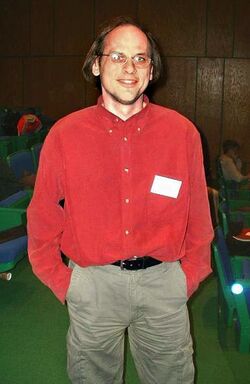Biography:Peter Woit
Peter Woit | |
|---|---|
 Peter Woit at Harvard University | |
| Born | September 11, 1957 |
| Nationality | United States |
| Alma mater | Harvard University Princeton University |
| Scientific career | |
| Fields | Theoretical physics |
| Institutions | Columbia University |
| Doctoral advisor | Curtis Callan[1] |
| Website | math |
Peter Woit (/ˈwɔɪt/; born September 11, 1957) is an American theoretical physicist. He is a Senior Lecturer in the Mathematics department at Columbia University. Woit is a critic of string theory has published a book Not Even Wrong, and writes a blog of the same name.[2]
Career
Woit graduated in 1979 from Harvard University with bachelor's and master's degrees in physics. He obtained his PhD in particle physics from Princeton University in 1985, followed by postdoctoral work in theoretical physics at State University of New York at Stony Brook and mathematics at the Mathematical Sciences Research Institute (MSRI) in Berkeley. He spent four years as an assistant professor at Columbia. He now holds a permanent position in the mathematics department, as Senior Lecturer and as Departmental Computer Administrator.[2][3]
Woit is a U.S. citizen and also has a Latvian passport. His father was born in Riga and became exiled with his own parents at the beginning of the Soviet occupation of Latvia.[4]
Criticism of string theory
He is critical of string theory on the grounds that it lacks testable predictions and is promoted with public money despite its failures so far[1], and has authored both scientific papers and popular polemics on this topic. His writings claim that excessive media attention and funding of this one particular mainstream endeavour, which he considers speculative, risks undermining public faith in the freedom of scientific research. His moderated weblog on string theory and other topics is titled "Not Even Wrong", a derogatory term for scientifically useless arguments invented by Wolfgang Pauli.
For the last eighteen years particle theory has been dominated by a single approach to the unification of the Standard Model interactions and quantum gravity. This line of thought has hardened into a new orthodoxy that postulates an unknown fundamental supersymmetric theory involving strings and other degrees of freedom with characteristic scale around the Planck length. […] It is a striking fact that there is absolutely no evidence whatsoever for this complex and unattractive conjectural theory. There is not even a serious proposal for what the dynamics of the fundamental 'M-theory' is supposed to be or any reason at all to believe that its dynamics would produce a vacuum state with the desired properties. The sole argument generally given to justify this picture of the world is that perturbative string theories have a massless spin two mode and thus could provide an explanation of gravity, if one ever managed to find an underlying theory for which perturbative string theory is the perturbative expansion.[5]
"The String Wars"
A discussion in 2006 took place between University of California, Santa Barbara physicists at the Kavli Institute for Theoretical Physics and science journalist George Johnson regarding the controversy caused by Lee Smolin and Woit's books.[6] The meeting was titled "The String Wars".[6][7]
Selected publications
- 1988, "Supersymmetric quantum mechanics, spinors and the standard model," Nuclear Physics B303: 329-42.doi:10.1016/0550-3213(88)90185-X
- 1990, "Topological quantum theories and representation theory" in Ling-Lie Chau and Werner Nahm, eds., Differential Geometric Methods in Theoretical Physics: Physics and Geometry, Proceedings of NATO Advanced Research Workshop. Plenum Press: 533-45.doi:10.1007/978-1-4684-9148-7_54
- 2006. Not Even Wrong: The Failure of String Theory & the Continuing Challenge to Unify the Laws of Physics. ISBN 0-224-07605-1 (Jonathan Cape), ISBN 0-465-09275-6 (Basic Books)
- 2017 Quantum Theory, Groups and Representations Springer International Publishing, Hardcover ISBN 978-3-319-64610-7, eBook ISBN 978-3-319-64612-1, doi:10.1007/978-3-319-64612-1
See also
References
- ↑ 1.0 1.1 Woit, Peter (2011) (in en). Not Even Wrong: The Failure of String Theory and the Continuing Challenge to Unify the Laws of Physics. Random House. p. 114. ISBN 9781446443019. https://books.google.com/books?id=pKKhVG5Bk5YC&pg=PA114.
- ↑ 2.0 2.1 "Department of Mathematics Faculty Bio: Peter Woit". Columbia University. http://www.math.columbia.edu/~woit/. Retrieved 2 November 2013.
- ↑ Woit, Peter. "Background Concerning the Weblog "Not Even Wrong" and Trackbacks to the ArXiv: Academic Background". Columbia University. http://www.math.columbia.edu/~woit/arxiv-trackbacks.html. Retrieved 9 May 2012.
- ↑ Peter Woit, "International Institute of Mathematical Physics in Riga" (June 27, 2004), Not Even Wrong.
- ↑ Woit, Peter, 2002, "Quantum Field Theory and Representation Theory: A Sketch."
- ↑ 6.0 6.1 "George Johnson, Science Journalist in Residence, KITP, The String Wars". Online.itp.ucsb.edu. 2006-10-20. http://online.itp.ucsb.edu/online/resident/johnson2/. Retrieved 2011-12-10.
- ↑ "QuickTime: George Johnson, Science Journalist in Residence, KITP, The String Wars". Online.itp.ucsb.edu. http://online.itp.ucsb.edu/online/resident/johnson2/rm/qt.html. Retrieved 2011-12-10.
External links
- 2002, "String Theory: An Evaluation," American Scientist 90(2): .
- 2002, "Quantum Field Theory and Representation Theory: A Sketch."
- Peter Woit's Home Page.
- Not Even Wrong, Woit's weblog.
- "The Unraveling of String Theory," by Michael Lemonick, Time (magazine) , August 21, 2006.
- Joseph Polchinski (2007) "All Strung Out?" a review of The Trouble with Physics and Not Even Wrong, American Scientist 95(1):1. (re-post at Cosmic Variance)
- Radio Interview from This Week in Science September 19, 2006 Broadcast.
- SPIRES publications for Peter Woit.[yes|permanent dead link|dead link}}]
- The Times "Review" of Not Even Wrong.
- Video of discussion/debate with Peter Woit on Bloggingheads.tv
